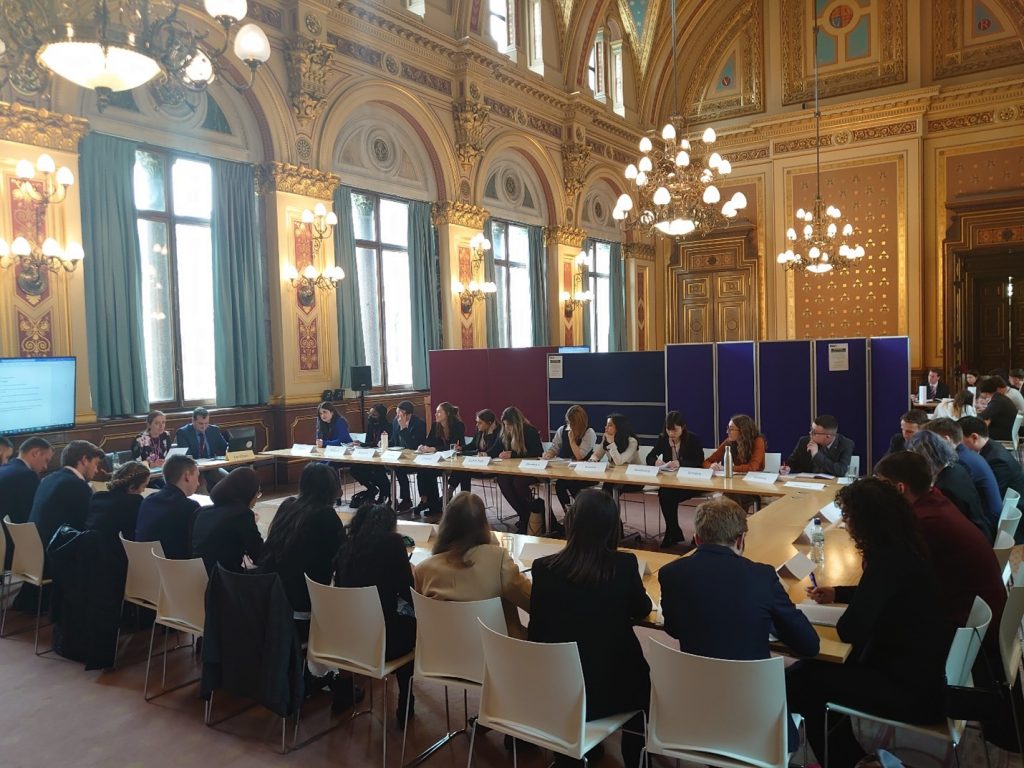My name is Abbey Stroud and I am a third year International Relations student studying abroad from Mount Allison University in New Brunswick, Canada. I was given the opportunity at the University of Stirling to apply to the British International Studies Association (BISA) and Foreign, Commonwealth and Development Office (FCDO) Model NATO 2022 as a way to gain a better understanding of the role that NATO plays in the world and to try my own skills at crisis decision-making and diplomacy The University of Stirling held an internal competition to select six 3rd and 4th year International Politics and Politics students, and I had the honour to be selected, and to then find I could represent my home country, Canada.
The Model NATO event was held in person at the FCDO in London on Friday 11 March 2022. We joined 90 students from universities from across the UK to take part in a crisis simulation based on an environmental disaster in the Mediterranean. The crisis saw the North Atlantic region faced with multiple earthquakes across the eastern Mediterranean and south-East Europe. In our simulation NATO met in three committees – the Civil Emergency Planning Committee, the Military Committee, and the North Atlantic Council.

Working as the Canadian delegate to the NATO Civil Emergency Planning Committee, I was able to gain a greater understanding of NATO itself as well as the complexities and challenges of trying to agree action under time pressure. Our goal was to pursue solutions to an evolving crisis by dispersing resources and cooperating multi-laterally to assess imminent threats. This was done while also considering national priorities. As a Canadian, I already possessed some understanding of Canada’s international relations, and it was interesting to be able to apply this in the context of the Civil Emergency Planning Committee.
One of the key driving factors for why I wanted to study International Relations is my own perspective as an individual born in a small town in Canada. One key takeaway I took from this experience is that, in simulating one of the highest of world stages, I saw that we all function as a dedicated and tireless small town. Each individual country within NATO is focused on the multilateral approach of aiding and supplying assistance to affected states at the shortest of notice. Much as local volunteer firefighters within a small town such as my own will, at the drop of a hat, race to aid another individual in distress, countries within NATO are passionately dedicated to strengthening democracy, freedom, and free will, and will use the resources of their home country to put out the ‘fires’ of threats to peace. My understanding of the importance of community and the strength that unity produces helped me to push forward language during the negotiations, and to work with NATO allies to ensure help was given during our crisis, including provisions for temporarily displaced persons, deploying healthcare professionals, and maintaining both naval and air presence surrounding affected countries of the crisis.
What I have begun to understand about international institutions, such as NATO, in my studies at Stirling, is that the work of such organizations can be understood through the same attitudes of small hardworking communities. I have been brought up alongside countless individuals who have put their heart and soul into making our community a safe and comfortable place to live. Growing up in an interdependent rural setting influenced my goals of working with organizations with international influence such as NATO. I was delighted to be awarded Distinguished Delegate on the NATO Civil Emergency Planning Committee for exemplary contributions to the NATO discussion in times of crisis.

I believe that the basic necessary factor that one must possess when working in international diplomacy is to pursue a passion. I have discovered that my passion is that of people and maintaining the basic right in life that allows for the strengthening of communities, which is peace. My community raised me to be a dedicated individual regardless of the task, and to use the opportunities that I have earned to be able to best represent my values and efforts to uplift others and pursue peace by any means. I believe that my passion for my home country greatly influenced my position in discussions throughout the simulated crisis. It is certain that I will be greatly influenced by this amazing opportunity in pursuing a future career in diplomacy. I have once again come to realize that, even at an international level, we can all be understood as small interdependent communities in the pursuance of unconditional support in times of crisis.